To replace a faulty expansion enclosure attachment SAS
cable with a new one received from CRU / FRU stock, use this procedure.
Be careful when
you are replacing the hardware components that are located in the
back of the system. Do not inadvertently disturb or remove any cables
that you are not instructed to remove.
Attention: If you need to replace more than one
cable, record which two ports, canisters, and enclosures each cable
connects, so you can match the connections with the replacement cables.
The system cannot operate if the expansion enclosure attachment SAS
cabling is incorrect.
More information about correct
expansion enclosure attachment SAS cabling can be found at Problem: SAS cabling not valid.
To replace a SAS cable, complete the following steps.
- Locate the connector at one end of the SAS cable that is
to be removed.
- Grasp the connector by its blue tab. Pull the tab.
The connector is released and slides out of the port.
- Repeat steps 2 and 3 on the other end of the SAS cable.
- To connect the replacement expansion enclosure attachment
SAS cable, connect each end to the vacated ports.
Attention: When you insert a SAS connector into
a SAS port, ensure that the orientation of the connector matches the
orientation of the port before you push the connector into the port.
- The cable connector and socket are keyed and it is important that
you have proper alignment of the keys when the cable is inserted.
- Before you insert the connector into the port, ensure that the
connector is rotated such that the blue tab is the lowest part.
- Figure 1 shows the correct orientation. The blue tab is always below
the port for expansion enclosure attachment SAS cables.
Figure 1. Identifying the proper orientation for SAS cable connector

- A click is heard or felt when the cable is successfully inserted.
You should not be able to disconnect the cable without pulling on
the blue tab.
- When both ends of a SAS cable are correctly connected, the green
link LED next to the connected SAS ports are lit. See Procedure: Finding the status of the SAS connections.
